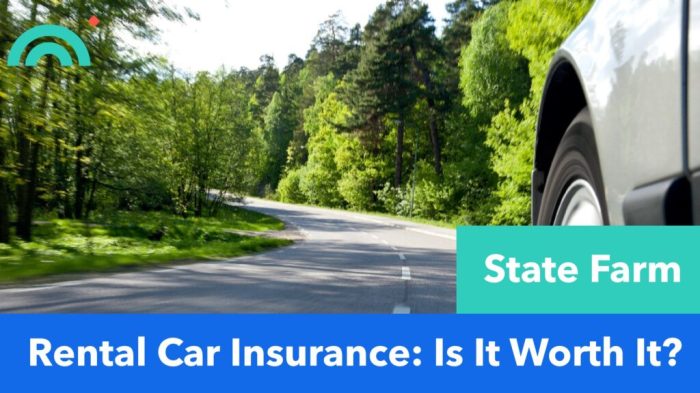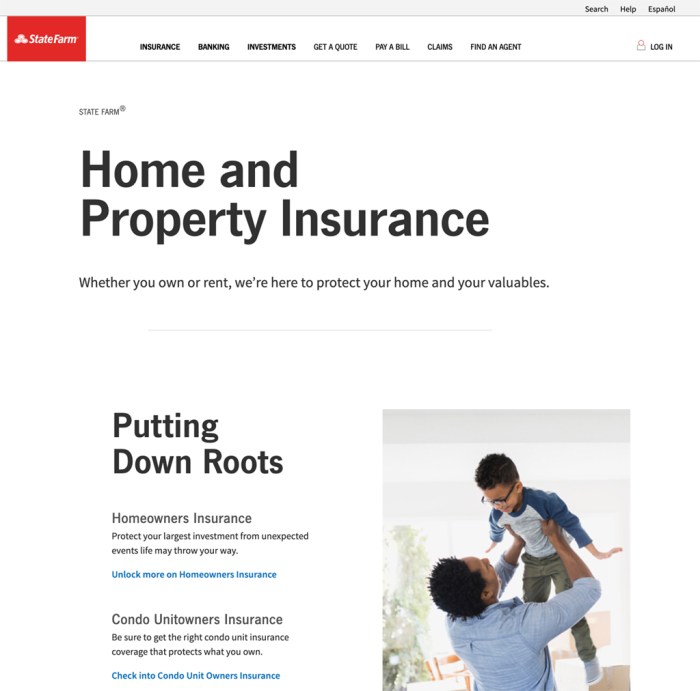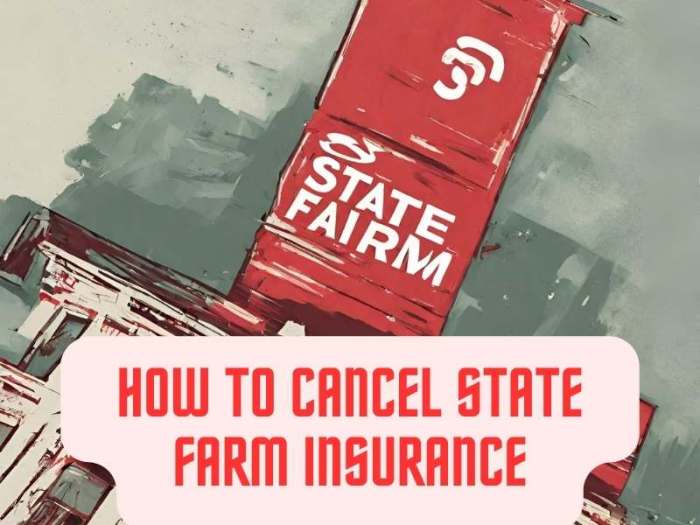State Farm non-owner car insurance policy – State Farm non-owner car insurance is a unique policy designed for individuals who don’t own a vehicle but still need coverage. This type of insurance can be a lifesaver for those who frequently borrow cars, drive rental vehicles, or rely on ride-sharing services.
Whether you’re a young driver just starting out, a seasoned driver who prefers to use public transportation, or someone who simply chooses not to own a car, a non-owner policy can provide peace of mind on the road.
State Farm’s non-owner policy offers a variety of coverage options, including liability, medical payments, and uninsured/underinsured motorist coverage. These options allow you to customize your policy to fit your specific needs and budget. Additionally, the policy can help protect you from financial responsibility if you’re involved in an accident while driving someone else’s car.
State Farm Non-Owner Car Insurance Policy Overview
A State Farm non-owner car insurance policy is designed to provide coverage for individuals who don’t own a car but still need insurance for driving situations. This policy provides liability coverage and, in some cases, additional protection like medical payments coverage.
This type of policy can be a valuable option for various individuals, including those who rely on borrowed or rented vehicles, frequently use ride-sharing services, or are occasional drivers.
Who Needs a Non-Owner Policy?
This type of policy can be beneficial for a wide range of individuals. Here are some common scenarios where a non-owner policy would be suitable:
- Occasional Drivers:Individuals who drive infrequently, such as those who primarily rely on public transportation or walking but occasionally need to borrow a car.
- Ridershare Drivers:Individuals who drive for ride-sharing services like Uber or Lyft and need insurance coverage while on the job.
- Borrowers of Vehicles:Individuals who frequently borrow vehicles from family or friends and want to ensure they are covered in case of an accident.
- Young Drivers:Young drivers who may not own a car but need insurance to drive a parent’s or guardian’s vehicle.
Examples of Situations Where a Non-Owner Policy Would Be Beneficial
Here are some specific situations where a non-owner policy could prove valuable:
- Accident While Driving a Borrowed Car:If you borrow a friend’s car and get into an accident, a non-owner policy would cover your liability for damages or injuries to others.
- Accident While Driving for Rideshare:While driving for a ride-sharing service, a non-owner policy can protect you from liability claims if you cause an accident.
- Hit-and-Run Accident:If you are hit by an uninsured or underinsured motorist while driving a borrowed vehicle, a non-owner policy’s uninsured/underinsured motorist coverage can help cover your medical expenses and property damage.
Coverage Options and Benefits

A State Farm non-owner policy typically offers a range of coverage options to suit individual needs. Understanding these options is crucial to ensuring you have the right protection for your specific driving situation.
Liability Coverage
Liability coverage is a core component of a non-owner policy. It protects you financially if you cause an accident that results in damage to another person’s property or injuries to others. Liability coverage typically includes:
- Bodily Injury Liability:This covers medical expenses, lost wages, and other damages related to injuries caused to others in an accident.
- Property Damage Liability:This covers the cost of repairs or replacement for damage to another person’s vehicle or property.
The amount of liability coverage you need depends on factors like your driving habits and the potential financial risks you face. It’s crucial to choose adequate liability coverage to protect yourself from significant financial losses in case of an accident.
Medical Payments Coverage
Medical payments coverage, also known as “Med Pay,” is an optional coverage that can help pay for your medical expenses, regardless of who is at fault in an accident. This coverage can be particularly valuable if you are driving a borrowed vehicle and don’t have access to your own health insurance.
Uninsured/Underinsured Motorist Coverage
Uninsured/underinsured motorist (UM/UIM) coverage is another optional protection that can help cover your medical expenses and property damage if you are hit by a driver who is uninsured or has insufficient insurance to cover your losses. This coverage can be vital, as accidents involving uninsured drivers are unfortunately common.
Eligibility Requirements and Application Process
To be eligible for a State Farm non-owner car insurance policy, you typically need to meet specific criteria. The application process involves providing certain documentation and may include a waiting period before coverage takes effect.
State Farm’s non-owner car insurance policy is a lifesaver for those who don’t own a vehicle but need coverage while driving someone else’s car. To get a personalized estimate for your potential premium, try out the State Farm auto insurance premium calculator , and see how affordable this valuable protection can be.
You’ll be surprised how easy it is to get the coverage you need, even without owning a car!
Eligibility Criteria, State Farm non-owner car insurance policy

Here are some common eligibility requirements for a State Farm non-owner policy:
- Valid Driver’s License:You must have a valid driver’s license in the state where you reside.
- Good Driving Record:A clean driving history with minimal traffic violations or accidents is generally preferred.
- Proof of Residence:You may need to provide proof of your current address.
- Financial Responsibility:State Farm may assess your financial history to ensure you can meet your financial obligations.
Application Process
The application process for a non-owner policy typically involves the following steps:
- Contact State Farm:Reach out to a State Farm agent or visit their website to begin the application process.
- Provide Information:You will need to provide personal information, including your name, address, date of birth, driving history, and any relevant details about your driving situation.
- Submit Documentation:You may need to provide supporting documentation, such as a copy of your driver’s license, proof of residence, and potentially a driving record.
- Receive Quote and Policy:State Farm will review your application and provide you with a quote for coverage. Once you accept the quote, your policy will be issued.
Tips for Maximizing Policy Approval
To increase your chances of successful policy approval, consider the following tips:
- Be Honest and Accurate:Provide complete and truthful information on your application. Any misrepresentations could lead to policy denial or cancellation.
- Maintain a Good Driving Record:Avoid traffic violations and accidents to maintain a clean driving history.
- Shop Around:Compare quotes from multiple insurance companies to ensure you are getting the best rates and coverage.
Cost Factors and Premium Calculation
The cost of a State Farm non-owner car insurance policy can vary depending on several factors. Understanding these factors can help you make informed decisions about your coverage choices and potentially reduce your premiums.
Key Factors Influencing Premiums
Here are some of the key factors that influence the premium for a non-owner policy:
- Driving History:A clean driving record with no accidents or violations generally results in lower premiums.
- Age:Younger drivers, especially those under 25, often pay higher premiums due to their higher risk of accidents.
- Location:Premiums can vary depending on the state and city you reside in, as accident rates and insurance regulations differ by location.
- Coverage Choices:The specific coverage options you choose, such as the amount of liability coverage or whether you opt for medical payments or UM/UIM coverage, will affect your premium.
- Vehicle Type:If you are frequently driving a borrowed vehicle, the type of vehicle you drive can also influence your premium.
Strategies for Lowering Premiums
Here are some strategies you can consider to potentially lower your premiums:
- Maintain a Good Driving Record:Avoid traffic violations and accidents to maintain a clean driving history, which can lead to lower premiums.
- Bundle Policies:If you have other insurance policies with State Farm, such as homeowners or renters insurance, bundling your policies can often result in discounts.
- Consider Deductibles:Choosing higher deductibles can often lower your premium, but it means you will pay more out-of-pocket if you file a claim.
- Shop Around:Compare quotes from multiple insurance companies to ensure you are getting the best rates and coverage.
- Ask About Discounts:Inquire about any available discounts from State Farm, such as good student discounts, safe driver discounts, or discounts for certain vehicle safety features.
Claims Process and Customer Service: State Farm Non-owner Car Insurance Policy
If you need to file a claim under your State Farm non-owner policy, it’s important to understand the process and what documentation you will need. State Farm also offers customer service resources to assist you throughout the claims process.
Filing a Claim
To file a claim, you typically need to follow these steps:
- Contact State Farm:Reach out to State Farm by phone, online, or through their mobile app to report the accident or incident.
- Provide Information:Be prepared to provide details about the accident, including the date, time, location, and any involved parties.
- Submit Documentation:You may need to provide supporting documentation, such as a police report, photos of the damage, and any medical records related to injuries.
- Follow Up:State Farm will investigate the claim and keep you updated on its progress. You may need to provide additional information or documentation as requested.
Customer Service

State Farm offers a range of customer service options to assist you with your non-owner policy. You can contact them through various channels, including:
- Phone:State Farm has a dedicated customer service phone line available 24/7.
- Website:You can access information, manage your policy, and file claims through State Farm’s website.
- Mobile App:The State Farm mobile app allows you to access your policy information, file claims, and communicate with customer service representatives.
- Agent Network:State Farm has a vast network of agents who can provide personalized assistance and guidance.
Comparison with Other Insurance Options
While a State Farm non-owner policy can be a valuable option for certain individuals, it’s essential to compare it with other insurance options to determine the best fit for your specific needs. Here’s a comparison of a non-owner policy with other common insurance options:
Renter’s Insurance
Renter’s insurance primarily covers your personal belongings against damage or loss due to theft, fire, or other covered perils. While it doesn’t provide car insurance, it can offer additional protection for your personal property if you’re living in a rented apartment or house.
Traditional Car Insurance
Traditional car insurance is designed for individuals who own a vehicle. It provides a broader range of coverage options, including collision and comprehensive coverage, which are not typically included in a non-owner policy. However, traditional car insurance can be more expensive than a non-owner policy, especially if you only drive occasionally.
Comparison Table
| Feature | State Farm Non-Owner Policy | Renter’s Insurance | Traditional Car Insurance |
|---|---|---|---|
| Coverage | Liability, medical payments, uninsured/underinsured motorist | Personal property | Liability, collision, comprehensive, medical payments, uninsured/underinsured motorist |
| Eligibility | Non-car owners, occasional drivers, rideshare drivers | Renters | Car owners |
| Cost | Generally lower than traditional car insurance | Relatively low | Generally higher than non-owner or renter’s insurance |
Wrap-Up
State Farm non-owner car insurance can be a valuable asset for individuals who don’t own a car but still need coverage. It’s a flexible and affordable option that can provide peace of mind while driving borrowed vehicles. By understanding the coverage options, eligibility requirements, and cost factors, you can make an informed decision about whether this type of policy is right for you.
Common Queries
What is the difference between a non-owner policy and traditional car insurance?
A non-owner policy covers you while driving someone else’s car, while traditional car insurance covers your own vehicle.
Do I need a non-owner policy if I have a car but it’s currently not insured?
No, you should maintain traditional car insurance even if your vehicle is not currently being driven.
What are the common exclusions in a non-owner policy?
Exclusions may include coverage for damage to the borrowed vehicle, personal property in the car, or certain types of accidents (like driving under the influence).
How do I file a claim with a non-owner policy?
You’ll follow the same process as with any other State Farm insurance policy. Contact State Farm directly and provide the necessary information.